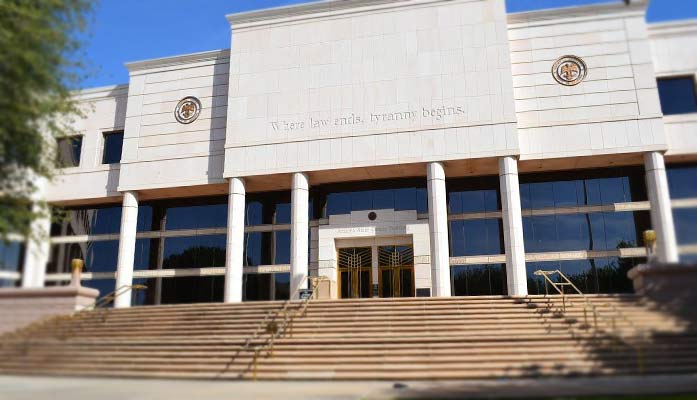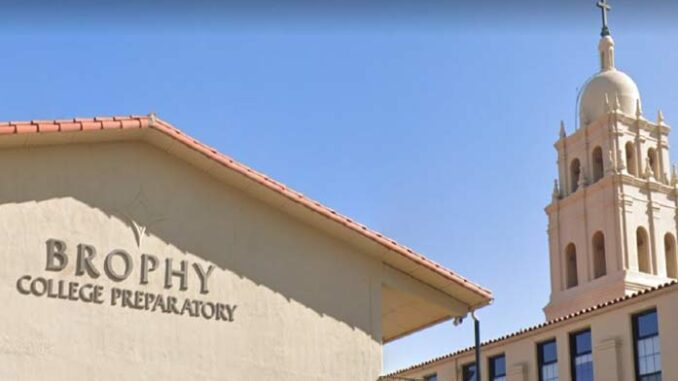
by Corinne Murdock | Aug 20, 2021 | Education, News
By Corinne Murdock |
Governor Doug Ducey’s program offering up to $7,000 in grants for low-income K-12 parents wanting to relocate their students due to their current school’s COVID-19 protocols began Friday. Eligible families have a total household income at or below 350 percent of the Federal Poverty Level, and show proof that their current school has COVID constraints, including: mask mandates, quarantines, vaccine mandates, or discrimination based on vaccination status. The grant funds may be used for a variety of education-related expenses beyond tuition like transportation, online tutoring, and even child care.
Ducey announced the $7,000 booster on Tuesday. The governor’s office cited Yale University research that found COVID-based school closures disproportionately harm low-income students. More affluent students reportedly didn’t exhibit any significant impairments.
“We are committed to keeping all Arizona kids on track, closing the achievement gap and equipping underserved students and families with the tools they need to thrive,” said Ducey. “Our COVID-19 Educational Recovery Benefit will empower parents to exercise their choice when it comes to their child’s education and COVID-19 mitigation strategies. It will also give families in need the opportunity to access educational resources like tutoring, child care, transportation and other needs. We know that historically disadvantaged communities bear the brunt of excessive and overbearing measures, and we want to ensure these students are protected.”
Parents interested in learning more about these grants can review or apply for the program here. Applicants are accepted on a first-come, first-serve basis.
These grants were just one of three plans increasing education funding that the governor introduced Tuesday.
Another plan that Ducey announced was $163 million in grant funding for district and charter schools that remain open all year. Ducey explained that the goal of this funding incentive is to increase funding to $1,800 per student.
The third plan Ducey issued offers up nearly $65 million to a variety of learning programs across all education levels: K-12 literacy, adult education, and teacher professional development. Like the plan offering up to $7,000 per student for low-income families, $3.5 million of these funds will help launch 50 new micro-schools: an alternative learning model to public and private schools for low-income families.
AZ Free News inquired with State Representative Michelle Udall (R-Mesa), the House Education Committee Chair, about this latest in education funds for parents. Udall didn’t respond by press time.
Corinne Murdock is a reporter for AZ Free News. Follow her latest on Twitter, or email tips to corinne@azfreenews.com.

by Corinne Murdock | Aug 20, 2021 | Education, News
By Corinne Murdock |
On Thursday, the Arizona Supreme Court ruled that Proposition 208 (Prop 208), the voter-approved increase on income taxes to fund public education, was unconstitutional and remanded to lower court. If that trial court determines that Prop 208 exceeds the constitutional spending limit, then Prop 208 would be killed. Chief Justice Brutinel authored the opinion.
The case, Fann, et al. v. State of Arizona, et al., challenged one major provision of Prop 208 and the circumstances of its approval.
First, the case questioned how Prop 208 exempted itself from the Arizona Constitution’s provisions on tax revenue spending caps, or the Education Expenditure Clause.
Brutinel ruled this aspect of Prop 208 unconstitutional. The chief justice made sure to note that this ruling rendered the other aspects of Prop 208 unworkable and unseverable. Meaning, no part of Prop 208 is enforceable if the trial court concurs with the Arizona Supreme Court’s opinion.
“We hold that the direct funding provision does not fall within the constitutional definition of grants in article 9, section 21 of the Arizona Constitution, and Prop. 208 is therefore unconstitutional to the extent it mandates expending tax revenues in violation of the Education Expenditure Clause,” wrote Brutinel. “Likewise, the remaining non-revenue related provisions of Prop. 208 are not separately workable and thus not severable.”
Second, the case challenged tax impositions made by voter initiative. The plaintiffs cited the Arizona Constitution’s Tax Enactment Clause, which stipulates that tax changes must be approved through a two-thirds vote by the state legislature.
The court disagreed with this assessment.
“Additionally, we hold that Prop. 208 does not violate article 9, section 22 of the Arizona Constitution (‘Tax Enactment Clause’), because that clause does not apply to voter initiatives,” wrote Brutinel. “Therefore, the bicameralism, presentment, and supermajority requirements found therein are inapplicable to Prop. 208.”
The Goldwater Institute, Snell & Wilmer, and Greenberg Traurig filed the lawsuit on behalf of the 11 plaintiffs: State Senate President Karen Fann (R-Prescott); State Senators David Gowan (R-Sierra Vista) and Vince Leach (R-Tucson); Arizona House Speaker Russell Bowers (R-Mesa); State Representatives Regina Cobb (R-Kingman), John Kavanaugh (R-Fountain Hills), Steve Pierce (R-Prescott); Montie Lee of Lee Farms; Dr. Francis Surdakowski; NO on 208; and Arizona Free Enterprise Club.
In a statement, Goldwater Institute Vice President for Litigation Timothy Sandefur classified the ruling as a win.
“Today represents a major victory for the hardworking taxpayers of Arizona,” said Sandefur. “The justices made clear that the state constitution’s limits on spending—which were added to the Constitution by the voters themselves—cannot be simply ignored, as Prop. 208’s funders attempted.”
Governor Doug Ducey concurred that this ruling signaled that the end was near for Prop 208.
“There is a clear legal path to Prop 208 being knocked down entirely, it’s only a matter of time,” tweeted Ducey. “The out-of-state proponents of this measure drafted bad language, and now they are paying the price.”
Proposition 208 (Prop 208) tacked on 3.5 percent to the existing 4.5 percent income tax for individuals making over $250,000 or couples making over $500,000. Previously, Arizona’s income tax rate was capped at 4.5 percent for individual incomes above $159,000 or joint incomes above $318,000. The revenue from the income tax increase would fund a wide variety of educator salaries and programs.
About 52 percent of Arizonans voted in favor of Prop 208 last November, and about 48 percent voted against it.
Corinne Murdock is a reporter for AZ Free News. Follow her latest on Twitter, or email tips to corinne@azfreenews.com.

by Corinne Murdock | Aug 18, 2021 | Education, News
By Corinne Murdock |
Some of Governor Doug Ducey’s $65 million for learning programs announced Tuesday will fund a controversial educational method: $1.6 million for social-emotional learning (SEL). SEL grapples with emotionally-charged social issues, such as murder or the history of slavery, in order to build social and self-awareness, as well as relational skills. It serves as a vessel for fostering diversity, equity, and inclusion (DEI). Specifically, the $1.6 million investment comes from $20.1 million in American Rescue Plan dollars.
Ducey’s SEL funds will go to Literacy Lab’s Leading Men Fellowship, a spawn of DC Public Schools funded initially by the DC Public Education Fund (DCPEF). The fellowship only recruits male, minority high school graduates. These young men give literacy support to pre-K students for a year in a residency-style program. One of the main goals for this fellowship is “diversifying the teacher pipeline.” This fellowship has some familiar faces for Arizonans – one of DCPEF’s current board members is Everfi Co-Founder and CEO, Tom Davidson.
Everfi has come under fire by Arizonan parents due to its curriculum, which is marketed as a free extracurricular resource, and after it was discovered that Everfi was bribing teachers with $15 Amazon gift cards for referrals to other educators. Amazon CEO Jeff Bezos is one of Everfi’s top donors.
Everfi’s curriculum promotes diversity initiatives: in one survey, Everi asked students private questions about their home life and encouraged them to think critically about their privilege. The company also provides an “Anti-Racism Extension Guide” for teachers, which promotes a book teaching tenets of critical race theory, called “28 Common Racist Attitudes and Behaviors,” and links to the New York Times’ 1619 Project.
Last September, Everfi committed $100 million over the next three years to expanding its curriculum on social injustice and economic disparities. Two main topics that Everfi will develop are exclusively on DEI and SEL.
Arizona is not listed as one of Leading Men Fellowship’s locations as of press time. The fellowship lists activity in the Metro DC area; Central Virginia; Baltimore, Maryland; Kansas City, Missouri; Massachusetts; and Milwaukee, Wisconsin.
Ducey classified the $65 million as program funding for K-12 literacy, adult education, and teacher professional development.
“We’re making targeted investments to connect adult students with jobs, strengthen literacy education in K-12 schools, enhance professional development for teachers, help students learn money management, expand access to high quality education, and much more,” said Ducey. “Students continue to excel in and out of the classroom as they recover from the effects of the pandemic and distance learning, and we will continue to put our resources toward helping them succeed.”
Corinne Murdock is a reporter for AZ Free News. Follow her latest on Twitter, or email tips to corinne@azfreenews.com.

by Corinne Murdock | Aug 18, 2021 | News
By Corinne Murdock |
In a response letter issued Tuesday, Brophy College Preparatory (Brophy) Principal Bob Ryan addressed the lengthy critiques of his vaccine mandate issued by hundreds of Brophy parents, alumni, donors, and supporters. That Brophy coalition questioned what they perceived to be fallacies and contradictions posed by the mandate in a letter to Ryan last Friday.
Ryan reiterated multiple times that Brophy was committed to following science, medicine, and data, which he said were “rapidly evolving.” He didn’t engage with some of the questions and requests posed by the Brophy coalition’s letter. Rather, Ryan invited skeptical parents to a vaccine informational webinar on Wednesday featuring pediatric specialist Dr. Jodi Carter, infectious disease specialist Dr. Ana Moran, and epidemiologist Dr. Nick Staab.
In their letter, this Brophy coalition recommended a series of modifications to the mandate, each prefaced with lengthy citations from COVID-19 thought leaders like the CDC and the World Health Organization (WHO). The coalition suggested elimination of asymptomatic testing; testing of vaccinated students if asymptomatic testing remains; allowance for on-campus testing; exemptions included for medical justification, religious objections, natural immunity, and informed refusal; a zero-tolerance policy for any retaliation against families who capitalize on exemptions; no vaccine requirement for overnight activities; and allowance of a negative test in lieu of quarantine for students exposed to COVID-19.
The principal doubled down on the policy that only vaccinated students may embark on overnight trips. He added that vaccinated students would be tested for COVID prior to those trips. Ryan didn’t address parents’ confusion over the logic of allowing testing for vaccinated students and not unvaccinated students, or the logic of barring unvaccinated students from overnight trips with fellow Brophy students but not weekend activities with non-Brophy students.
Ryan also didn’t address the critics’ concerns over the quarantining aspect of the policy. Those critical of the mandate questioned the logic of quarantining unvaccinated students who tested negative for the virus.
Not all concerns were ignored, however. Ryan did concede to offer changes to several aspects of the vaccine mandate policy.
As for natural immunity, Ryan ignored the data provided by the vaccine mandate skeptics. He asserted that Brophy would only look to the CDC for its guidance. Ryan did add that students that tested positive for COVID-19 wouldn’t have to undergo biweekly testing for 90 days, in accordance with current CDC belief that natural immunity lasts 90 days.
Another issue that the Brophy community had with the vaccine mandates concerned the limitation on where unvaccinated students could receive their bi-weekly testing. Originally, Brophy’s vaccine mandate required laboratory or pharmacy tests, and barred on-campus and at-home tests. For that, the Brophy coalition questioned Ryan’s intentions with the mandate. They cited one of his media interviews, in which he insinuated that making the vaccine mandate burdensome was intentional so as to coerce vaccination.
In response, Ryan announced that Brophy will bring on-site vaccinations and testing to campus by September 13. He didn’t address any of the Brophy coalition’s claims about the efficacy of on-campus and at-home tests, or his intentions with the mandate.
Despite the hundreds that made up the Brophy coalition expressing discontent with the vaccine mandate, Ryan characterized the on-campus mood in his letter as “lighthearted” overall.
“Our students are happy to be back in the classroom, to be engaged with their friends and enjoying activities,” wrote Ryan. “It is our goal to keep the enthusiasm high and the daily experience as close to normal as possible, even while we continue to deal with the realities of a pandemic.”
Corinne Murdock is a reporter for AZ Free News. Follow her latest on Twitter, or email tips to corinne@azfreenews.com.

by Corinne Murdock | Aug 18, 2021 | News
By Corinne Murdock |
Hundreds of Brophy College Preparatory (Brophy) parents, alumni, and donors urged the private school to overhaul its vaccine mandate in a letter issued Friday. Earlier this month, Brophy imposed a vaccine mandate similar to President Joe Biden’s mandate for federal employees and contractors – if an individual isn’t fully vaccinated, they must adhere to masking restrictions, social distancing measures, and frequent testing, not to mention limits on extracurricular opportunities.
In their letter, this Brophy coalition recommended a series of modifications to the mandate, each prefaced with lengthy citations from COVID-19 thought leaders like the CDC and the World Health Organization (WHO). The coalition suggested elimination of asymptomatic testing; testing of vaccinated students if asymptomatic testing remains; allowance for on-campus testing; exemptions included for medical justification, religious objections, natural immunity, and informed refusal; a zero-tolerance policy for any retaliation against families who capitalize on exemptions; no vaccine requirement for overnight activities; and allowance of a negative test in lieu of quarantine for students exposed to COVID-19.
The letter claimed that the mandate exempting vaccinated students from biweekly testing failed to follow its own rationale of ensuring student safety. It cited a July study from the CDC, which indicated that vaccination doesn’t necessarily reduce viral load or prevent transmission. It also questioned the scientific validity of enforcing quarantines for unvaccinated students, even if they test negative for COVID-19.
Additionally, the letter questioned why biweekly testing was sufficient to rule out COVID-19 cases in unvaccinated students for in-person learning, but not for overnight activities. Brophy currently requires students to be vaccinated for overnight activities and any extracurriculars outside of the Phoenix metropolitan area. It also questioned why the vaccine mandate didn’t address the interactions Brophy students would have with non-Brophy students on the weekends – those that may not be tested regularly or vaccinated – but extended oversight to overnight activities with Brophy students required to be vaccinated or tested.
On the same subject of Brophy’s testing requirements, the letter questioned why at-home and on-campus tests weren’t permissible, but laboratory or pharmacy tests were admissible regardless of their quality. The letter asserted that officials wanted to increase the cost and inconvenience of being unvaccinated. It also noted that no other corporations, schools, or government agencies in the state were subject to such frequent measures of testing, pointing out the WHO’s advice that asymptomatic testing is unnecessary.
The letter accused Brophy Principal Bob Ryan of crafting the vaccine mandate to be so burdensome that students would eventually relent and get vaccinated.
“Principal Ryan admitted to a television reporter, ‘I’ve heard from some of [BCP parents] who’ve said, “You know, this [choice between vaccination and twice-a-week laboratory tests] has kind of been the piece that’s pushed us over the line and so we’re now going to get our kid vaccinated” and we’re hoping for that actually,’” recounted the letter. (original emphasis included)
The letter also questioned why Brophy hadn’t bothered to accommodate for certain students, such as those with pre-existing chronic or genetic conditions, religious objections, natural immunity, and/or those who choose informed refusal.
The 9-page letter had a total of 35 citations, and 11 pages of signatures. A majority of those 11 pages were filled with the names of hundreds of parents, alumni, donors, and community members.
One city councilmember and 27 former and current state legislators also signed onto the letter.
From the Arizona House, State Representatives Brenda Barton (R-Payson), Leo Biasiucci (R-Lake Havasu City), Walt Blackman (R-Snowflake), Shawnna Bolick (R-Phoenix), Judy Burges (R-Prescott), Joseph Chaplik (R-Scottsdale), Regina Cobb (R-Kingman), John Fillmore (R-Apache Junction), Gail Griffin (R-Hereford), Steve Kaiser (R-Phoenix), Quang Nguyen (R-Prescott), Becky Nutt (R-Clifton), Jacqueline Parker (R-Mesa), Kevin Payne (R-Peoria), Bret Roberts (R-Maricopa), Justin Wilmeth (R-Phoenix), Speaker Pro Tempore Travis Grantham (R-Gilbert), and former State Representative Jill Norgaard (R-Phoenix) all signed onto the letter.
State Senators Nancy Barto (R-Phoenix), Sonny Borrelli (R-Lake Havasu City), David Livingston (R-Peoria), J.D. Mesnard (R-Chandler), Warren Petersen (R-Gilbert), Wendy Rogers (R-Flagstaff), Kelly Townsend (R-Mesa), and former State Senators Sylvia Allen (R-Snowflake) and David Farnsworth (R-Mesa) were named in the letter as well.
Only one from the Phoenix City Council, Councilman Sal DiCiccio, signed onto the letter.
Corinne Murdock is a reporter for AZ Free News. Follow her latest on Twitter, or email tips to corinne@azfreenews.com.





